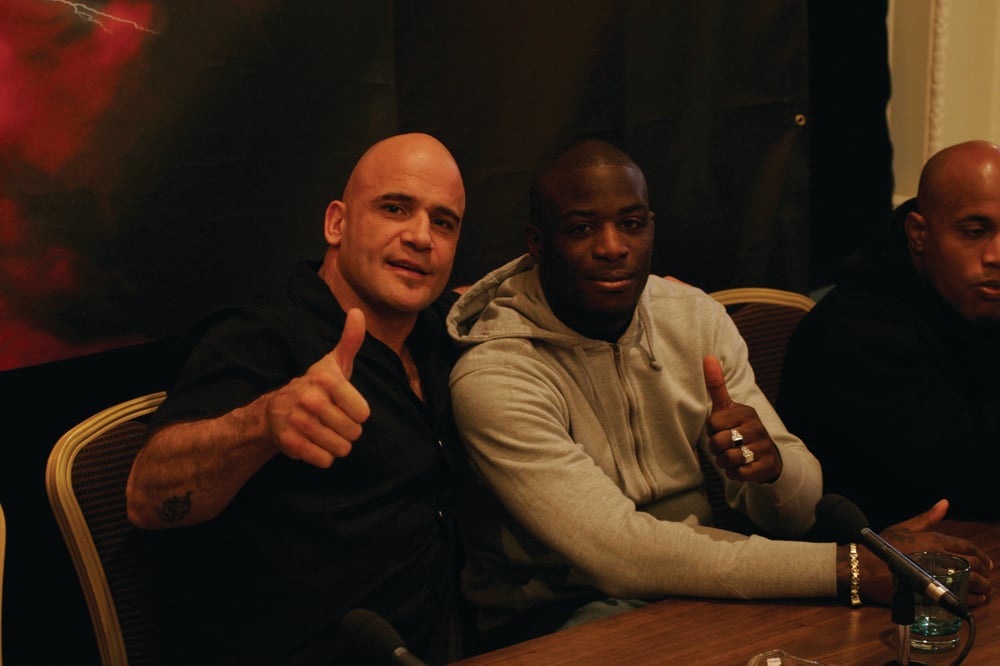
Issue 044
December 2008
Every time you watch an MMA show on television or DVD, one of the things that will immediately stand out is the commentary. Whether enlightening and entertaining, or misguided and irritating, the men behind the microphone are a vital part of the televised experience.
Fighters Only spoke to five of the sport’s leading voices to get their views on the importance of commentary, the art of preparation, the use of humour, the tricky question of whether a commentator needs in-ring experience, and finally, the sheer pleasure of the job.
Known to millions worldwide as the voice of the UFC, Mike Goldberg is a hugely experienced sports announcer who has covered the National Football League (NFL), the National Hockey League (NHL) in America, and more American college sports than you can shake a helmet, stick, bat, or ball at. Shortly to broadcast his 100th UFC event, Goldberg calls his work “the most important thing in my life” next to his wife and children.
The well-travelled and versatile commentator, actor, and musician, Stephen ‘The Fight Professor’ Quadros, has worked for (among many, many others) Pride FC, Cage Rage, the IFL, and now EliteXC. Recalling some of the huge fights he’s worked on, Quadros calls the job “among the greatest experiences I have ever had in life.”
A fan of MMA since 1993, multilingual former pro wrestling commentator Oliver Copp spent eight years battling sceptical TV industry types to bring MMA to German television, and began commentating on live UFC shows and DVDs, in 2003. One of the most knowledgeable and jovial MMA analysts on Earth, Copp has deep pro wrestling roots but calls MMA “the way of the future”.
A former pro wrestler and fighter, and current stuntman, actor, writer, and broadcaster, Paul Lazenby trained and fought out of the Pancrase dojo in Japan in 1997, before commentating on numerous Canadian events and several seasons of BodogFight. Lazenby got into the commentary business by simply doing a favour for a cash-strapped friend, and is now one of MMA-mad Canada’s most respected commentators.
With booming tones and a vocabulary as vast as his home country, Canadian Mauro Ranallo is one of the sport’s most recognisable voices and has commentated for EliteXC, K-1, Pride FC and various smaller groups. Describing himself as “a student of the game, a historian” Mauro aims to “complement and enhance people’s enjoyment of watching a show.”
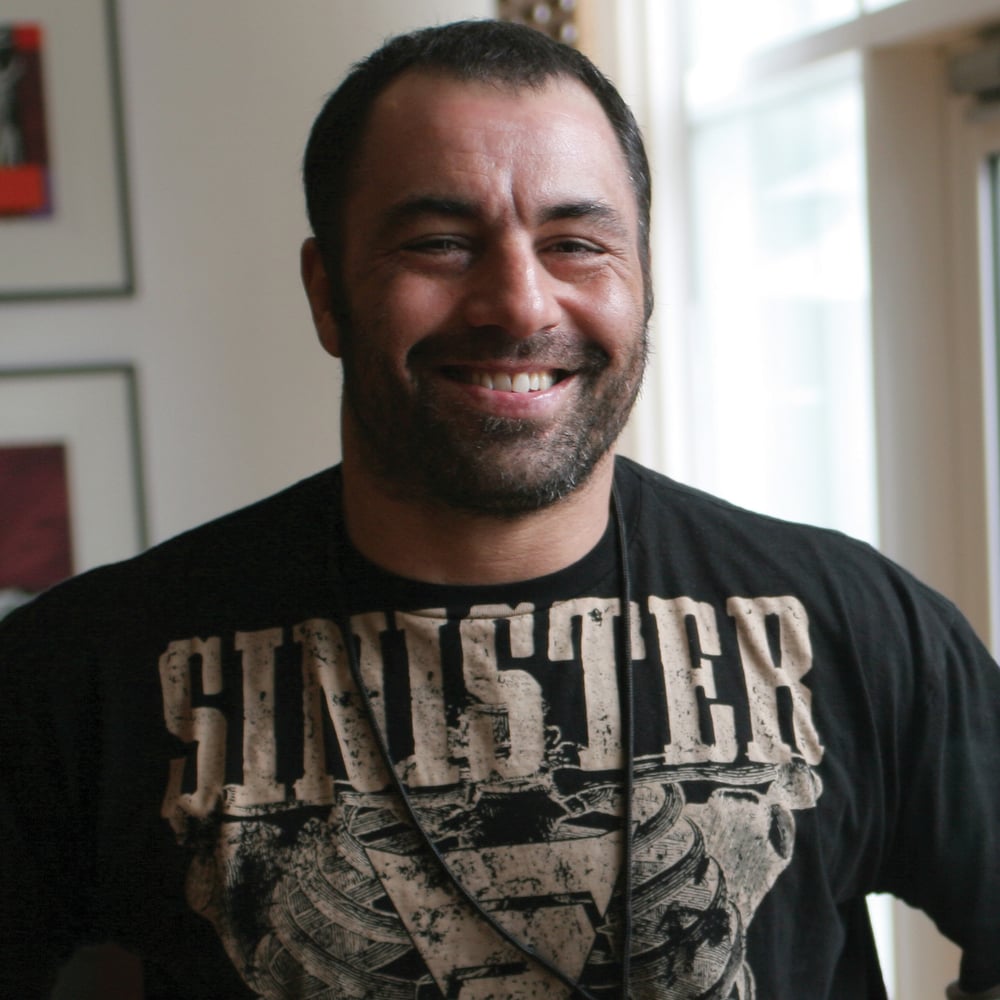
JOE ROGAN: SHOOTING FROM THE LIP
Professional stand-up comic and Brazilian jiu jitsu brown belt, Joe Rogan has been bringing his unique brand of excitable insight and fearless overstatement to UFC broadcasts for years. Possibly his finest hour came in June 2006 when one judge ludicrously called Rashad Evans’ total domination of Stephan Bonnar a draw. Joe had a solution:
- Joe: I don’t know who the judge is who scored that fight a draw, but that guy should be shot.
- Mike Goldberg: That’s against the law.
- Joe: Well, how about just in the leg, or maybe in the nuts? And no, I’m not drunk or high.
As his friend and regular broadcast partner Goldberg told us, “His passion is undeniably, 100% pure. When he tells you every sport except the UFC sucks he’s being 100% serious. He really means that. He’s so educated about the sport and so passionate about it, on and off the air.”

Proper preparation prevents piss-poor performance
Obviously there’s a lot more to commentary than simply showing up, slapping on the headsets, clutching the microphone, and yapping away, but how much more to it is there. And how much of the work is actually done off the air? Mike Goldberg notes, “I’m prepping every day, it really commands my life – I’m a prep freak. I’ve always been like that, in every sport I’ve covered. If you know you’ve done everything you can then you know you’re prepared and the hard work is over, you’re onto the fun part – you owe the fans who take the time to watch the show that courtesy of being as well prepared as you can.”
Oliver Copp adds, “Since I follow the MMA scene virtually every day, my biggest preparatory effort is to keep my binder of fighter information current. From the fight results, to particulars of the fights, to things they said either before or after the fights, to statements they made in the media; I have everything accessible in a way that I can use it on a live broadcast.”
Mauro Ranallo keeps a similar archive of information on “every fighter I’ve ever worked with. Right before a show there’s a couple of solid days of going through those notes and watching tapes, but I really do prep every single day. As much as the fighters prepare physically, I think we as announcers work just as hard mentally, because it’s up to us to make people care about those fighters who go in there and risk their lives. Commentary is a lot harder than it looks, so when we make it look easy that’s because of all the work we put into it.”
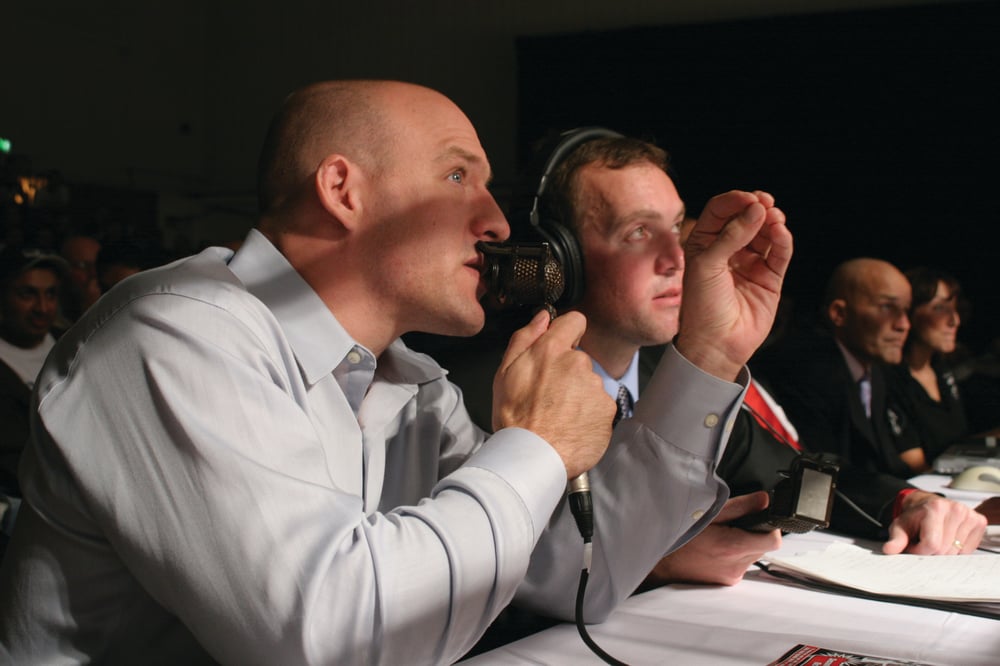
Jiu-jitsu jibber jabber
Fresh from all that preparation, there can be a temptation for commentators to cram too much information into their two or three hours. UFC heavyweight Frank Mir’s breathlessly non-stop early appearances as a colour commentator for WEC are a prime example. Ignoring Mauro Ranallo’s basic principle that “a good commentator should complement the action, not detract from it or try and take over too much”, Mir bombarded the viewing public with a never-ending stream of jiu-jitsu jibber jabber, painstakingly explaining every single thing to the point it became utterly numbing.
Over time, Mir has developed into a superb analyst and it’s a similar evolution Oliver Copp went through in his earlier days as a pro wrestling announcer. “When I started out, I was a know-it-all, robotic type of announcer who called every move – probably like the average hardcore fan off the street would call matches. You have to shed that way of thinking if you want to become a broadcaster – there is such a thing as information overkill.”
Of course, too little information or knowledge is even worse, both for the frustrated audience and sometimes for the rest of the commentary team. Paul Lazenby found sharing the Bodog broadcast booth with aged boxing analyst ‘Colonel’ Bob Sheridan “a tough situation. Bodog fired Lon [McEacheran] and took Jeff [Osborne, MMA promoter, commentator, matchmaker and all-around guru] out of the broadcast team and brought in Bob. I was going through some pay negotiations with them and they brought him in for double what I was making, and he knew less than nothing. It was so frustrating because Jeff and Lon and I worked so well as a team but Bob came in and I had to carry his weight.”
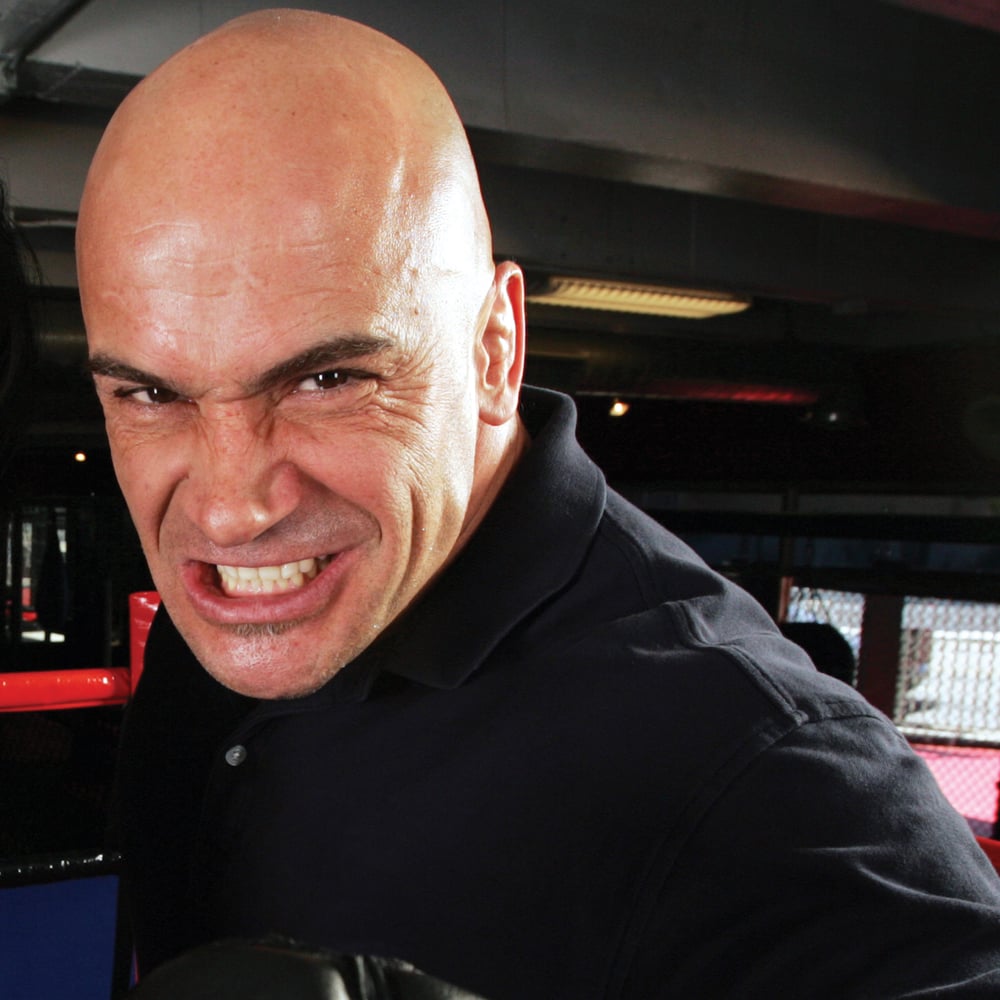
BAS RUTTEN: MMA'S KING OF COMEDY
According to Stephen Quadros, “Humour in broadcasting is something that can make it more interesting and even memorable. But it can’t be forced, otherwise it makes the show sound amateurish and forced. You’ve either got it or you don’t.” He should know, having shared the Pride FC broadcast booth with always-quotable MMA legend Bas Rutten.
Here are just a couple of their classic exchanges:
- Bas: He has a black belt in Brazilian jiu-jitsu.
- Stephen: Yes, well, many of the fighters have a black belt.
- Bas: Yes, but in Brazilian jiu-jitsu you cant buy your belt like in say, tae kwon do.
- Stephen: Do you have any belts?
- Bas: I have a brown belt in tae kwon do.
- Bas: Why doesn’t he punch him?
- Stephen: Because he doesn’t train in stand-up.
- Bas: Hasn’t he ever seen anyone throw a punch?
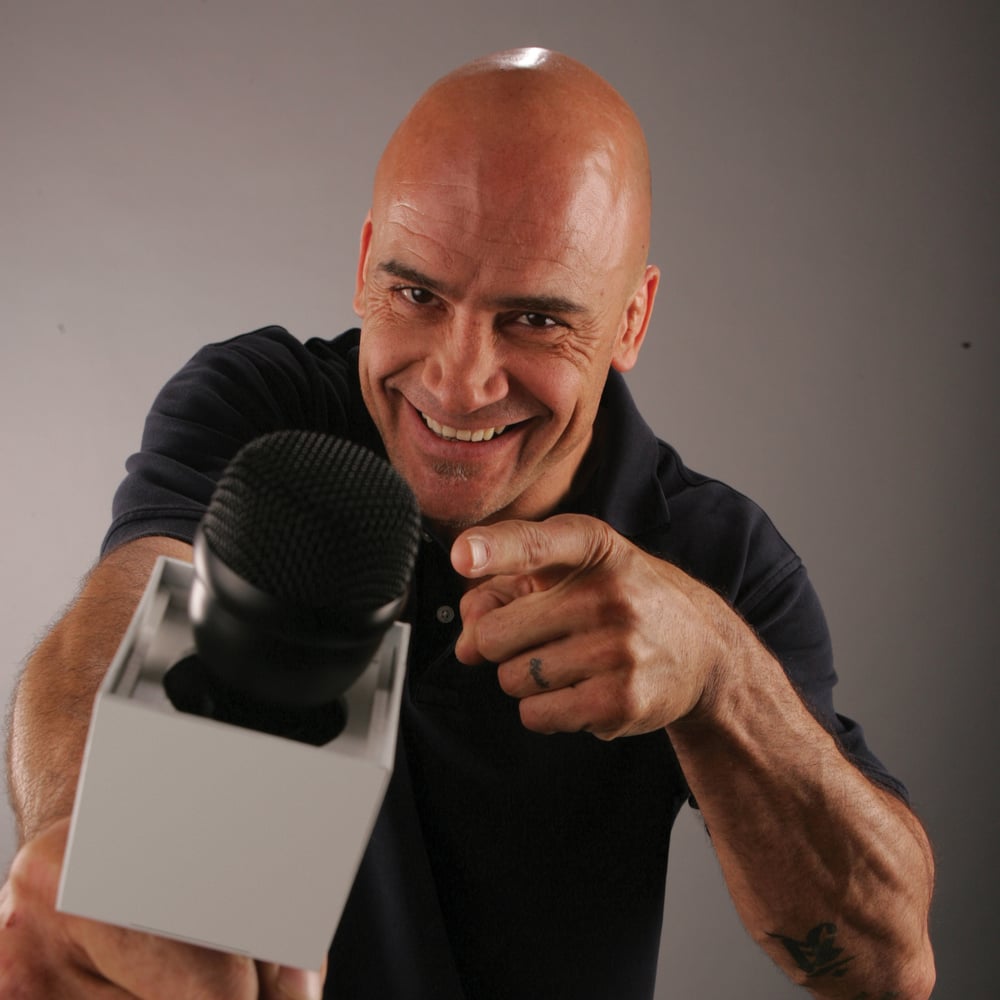
THE BAS RUTTEN DRINKING GAME
“Ooooh that’s a nice shot to the liver. You know, I heard that there’s some people out there that take a shot of whatever they are drinking every time I say liver shot. So this one’s for you guys: liver shot, liver shot, liver shot.” Bas Rutten
That’s right, Bas’s unforgettably eccentric Pride FC commentary inspired a drinking game. Here’s a selection of rules to be observed when listening to Rutten. The game should ideally be played with a few cans of beer, some hard liquor and a shot glass. Please note: following the rules of this game may end in serious drunkenness, a horrifying hangover and, quite possibly, death. You have been warned…
Take a drink when:
- Bas mentions having used a technique in a previous fight.
- Bas hesitates for more than five seconds “Hmmmmm, umm, yeah...”
- Bas says what he would do in any given situation, “Yeah, now here I’d go for the mount...”
- Bas disagrees with a broadcast partner.
- Bas says: “OHHHHH!”
- Bas says: “Yeah, I think so too...”
- Bas says: “It’s gonna be over!”
- Bas says: “WOW!”
- Bas tells an anecdote concerning a fighter’s past.
- Bas suggests what a fighter will do next.
Do a shot when:
- Following your drink from ‘Bas suggests what a fighter will do next’, said fighter actually does it.
- Whenever Bas stammers and excuses himself for messing up a line
- Bas mentions the liver in any way shape or form.
Do a double-shot when:
- Bas says “LIVER KICK!”
Those tricky questions: is experience everything?
Plenty of people in the sport feel only those who have actually competed are truly qualified to commentate or critique it. Former fighter Paul Lazenby sees such experience as “an undervalued, underrated commodity. That’s why you’ll often see a third man on the commentary team, a fighter who really understands what goes through another fighter’s mind in the competitive arena. It takes someone like that to fully understand it, to understand the training, and to understand actually getting in there and fighting. That doesn’t mean you have to have been a fighter to be a good broadcaster, there are some great ones, like Mauro Ranallo, who never have, and never will, get in the cage.”
“To be a good analyst, a good colour commentator, I think it definitely helps to have been an active participant, no matter what the sport, whether it’s boxing or football or mixed martial arts,” says Ranallo. “But in order to do play-by-play it’s more important that you’re a student of the game, and to have an understanding and background in broadcasting. The play-by-play announcer is the glue that holds the broadcast together.” Lazenby fully agrees, noting the contribution of his original Bodog broadcast partner Lon McEacheran. “He’s not an MMA guy, but he’d done his homework and you could just sit him down in front of anything and he could call it. We used to call him the ‘Traffic Cop’ because he’d be there just directing the whole broadcast.”
In any case, professional fighting experience is certainly no guarantee of quality in the broadcast booth. Take Frank Trigg, an 11-year veteran of the sport and an excellent talker, Trigg nonetheless fails to understand something as basic as the sport’s scoring system. On more than one occasion during his commentary duties for Pride FC, Trigg complained about a unanimous judges’ verdict, asserting it should “at least have been a split decision”. This is nonsense, as a unanimous decision could be delivered in an exceptionally close fight, while a split decision could be produced despite one fighter’s utter dominance due to the different viewpoints of the three judges, their positioning, or simple incompetence.

Those tricky questions:freedom of speech
MMA commentators have to navigate that delicate minefield of knowing what to say, when to say it, and who to say it to - but it doesn’t end there. The sport’s fragmentation with so many competing promotions brings some political complications too. Many observers lambasted Mauro Ranallo earlier this year for praising UFC middleweight champion Anderson Silva, even as EliteXC’s own middleweight champ Robbie Lawler was on screen. On the other hand, seemingly every time UFC commentators Mike Goldberg and Joe Rogan pick up their microphones, the sport’s hardcore fanbase is outraged by their ‘UFC first’ approach. Is there a ‘right’ way to do it?
Stephen Quadros is free to mention the UFC and other promotions on EliteXC broadcasts, because as he is an employee of TV station Showtime, he doesn’t work directly for a fight promotion. “As a result I do not have to deal with all the tribal, and sometimes feuding or childish, fight game politics,” he says. His frequent broadcast partner Mauro Ranallo is very definite about the subject. “I truly hate the policy of revisionist history and pretending nothing else exists. I think when you take that approach you’re robbing everyone of something, and not only that but you’re insulting people’s intelligence. This sport isn’t just UFC, its mixed martial arts, and kudos to them because they’re the dominant promotion out there and I love their fighters and their shows, but I do feel the commentators are under pressure to not talk about anything outside the organisation. Well, perhaps more Mike Goldberg, because Joe Rogan seems to have carte blanche to say whatever he wants!”
Unsurprisingly, Mike Goldberg sees things very differently, insisting “For me to spend time on a three-hour pay per view talking about other guys is just an insult to the guys on the card who trained for weeks and months to be there. It’s not like we just don’t talk about other fighters in other promotions. If you watch, you’ll notice we don’t even really talk about other UFC fighters on the show. When Kenny Florian and Roger Huerta are walking down to the Octagon they deserve our full attention. Besides, nobody can accuse Joe of not speaking his mind.”
Oliver Copp feels Goldberg and Rogan are far from the ‘company shills’ some accuse them of being. “They say commentators who work for a channel have more leeway to be critical than commentators who are bound to the promotion itself. I don’t think that’s necessarily the case. If you know what to listen for, you’ll find lots of openness in what Goldie and Rogan say, for instance. And they can phrase their criticism intelligently enough that somebody with MMA knowledge will pick up on it immediately.”
The rewards
All five commentators we spoke to could definitely agree on one thing, and that is the pleasure they get from their profession. Oliver Copp calls his work “a tremendous responsibility”, but even still, he loves “the challenge to provide commentary that adds to the product in a way that it makes boring fights watchable, average fights good and good fights very good. It’s not difficult calling a great match. Every sportscaster can do it. The real fun lies in making a Tim Sylvia stinker seem much better than it is.” The always-talkative Paul Lazenby simply says, “I couldn’t think of a better job. For 39 years people have been telling me to shut up and here I was getting paid just to keep talking.”
It’s no surprise that Mike Goldberg loves his work. “It really is the greatest job in the world. I’d love to do the Superbowl, the World cup or the NBA finals, but I really do think I’ve got the best gig in the world. Every time, every UFC show… the energy from the crowd, it’s really just like nothing else. I’ve covered the Stanley Cup [NHL ice hockey final], and I’ve been around the Superbowl, but this is something else, it’s off the charts – I’m just overwhelmed and blessed and, I may be running out of things like that to say, but it’s really not pressure, it’s a pleasure. I want to keep getting better, every time out. I don’t want to stop trying to achieve more. When you stop learning, when you stop trying to improve, that’s when you might as well hand the microphone over to somebody else.”

MAURO RANALLO, THE KING OF CHEESE
Known for his distinctive voice, Mauro Ranallo also has a superb sense of humour, but a single comment, his ‘moment of infamy’, got him into serious trouble with EliteXC’s TV paymasters Showtime, thanks to a women’s fight in September 2007 involving the very attractive Gina Carano:
- Mauro: [quoting Tonya Evinger at the weigh-ins] ‘I’d rather make out with Gina Carano but instead I’m gonna have to knock her out’.
- Bill Goldberg: I’m not gonna touch that one with a 25-foot pole, Mauro.
- Mauro: I’d like to touch it with a 25-centimetre one, but instead we’ll just call the fight…
Disappointingly, Mauro explained this “What I actually meant was that I’d like to be that close up to see them kissing. I really wish I could tell you I intended that line the way everyone inferred it but I didn’t. Of course I realised as soon as I watched it back how it sounded but that wasn’t the intention at all. As much as people say I have all my lines scripted out, and I know I’m the Pharaoh of Fromage, the Chancellor of Cheese, the best and funniest moments aren’t prepared, they just happen.”


